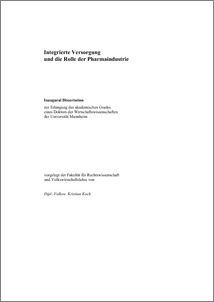|
Integrierte Versorgung und die Rolle der Pharmaindustrie
Koch, Kristian
![[img]](https://madoc.bib.uni-mannheim.de/style/images/fileicons/application_pdf.png)  Vorschau |
|
PDF
Dissertation_Kristian_Koch_2NEU.pdf
- Veröffentlichte Version
Download (1MB)
|
|
URL:
|
https://madoc.bib.uni-mannheim.de/2378
|
|
URN:
|
urn:nbn:de:bsz:180-madoc-23781
|
|
Dokumenttyp:
|
Dissertation
|
|
Erscheinungsjahr:
|
2009
|
|
Titel einer Zeitschrift oder einer Reihe:
|
None
|
|
Ort der Veröffentlichung:
|
Mannheim
|
|
Hochschule:
|
Universität Mannheim
|
|
Gutachter:
|
Wille, Eberhard
|
|
Datum der mündl. Prüfung:
|
15 Juni 2009
|
|
Sprache der Veröffentlichung:
|
Deutsch
|
|
Einrichtung:
|
Fakultät für Rechtswissenschaft und Volkswirtschaftslehre > VWL, Finanzwissenschaft, Gesundheitsökonomie(Wille 1974-2010, Em)
|
|
Fachgebiet:
|
330 Wirtschaft
|
|
Fachklassifikation:
|
JEL:
I18 M10 I11 ,
|
|
Normierte Schlagwörter (SWD):
|
Managed Care , Pharmazeutische Industrie , Arzneimittelversorgung , Arzneimittelmarkt , Arzneimittel , Gesundheitswesen
|
|
Freie Schlagwörter (Deutsch):
|
Integrierte Versorgung , Selektivverträge , neue Versorgungsformen , Gesetzliche Krankenversicherung
|
|
Freie Schlagwörter (Englisch):
|
Managed Care , Integrated Care , Pharmaceutical Industry , Healthcare
|
|
Abstract:
|
In der vorliegenden Arbeit werden Handlungsoptionen Dritter unter besonderer Berücksichtigung der pharmazeutischen Industrie unter den neuen Rahmenbedingungen integrierter Versorgungsformen in der Gesetzlichen Krankenversicherung aufgezeigt. Ziel der Analyse ist es, Instrumente und Organisationsformen des Gesundheitsmanagements zu identifizieren, die einzelnen pharmazeutischen Unternehmen ermöglichen, sich stärker als bisher als Partner in neuen Versorgungskonzepten einzubringen und gleichzeitig Effizienz und Effektivität der Gesundheitsversorgung erhöhen. Dabei werden aufbauend auf einer Situationsanalyse des deutschen Gesundheitswesens, sowie einer Darstellung Organisationsformen und Steuerungselemente von Managed Care ein Überblick über die verschiedenen Organisationsformen der Integrierten Versorgung (Modellvorhaben, Strukturverträge, Hausarztzentrierte Versorgung, strukturierte Behandlungsprogramme, besondere ambulante Versorgung, Integrierte Versorgung gemäß §140 a-d SGB V) gegeben. Im weiteren Verlauf stellt der Autor die Rolle des Arzneimittels im Versorgungsprozess und die derzeitige Stellung der Pharmaindustrie im deutschen Gesundheitssystem dar. Einzelne Pilotprojekte zeigen, wie Pharmaunternehmen sich bereits heute indikationsspezifisch und regional begrenzt als Versorgungspartner positionieren. Bezüglich der zukünftigen Rolle der Pharmaindustrie werden in dieser Arbeit daher die Rollen als Steuerungspartner, Prozesspartner und Strukturpartner unterschieden. Die Rolle als Steuerungspartner in der Arzneimitteltherapie ist dem originären Geschäftsmodell der Pharmaindustrie dabei am nächsten. Eine Integration lässt sich dabei durch Risk-Sharing Verträge und Drug-Capitation Verträge begrenzen. Die Rolle der Pharmaindustrie als Partner in der Prozessoptimierung umfasst besonders versorgungsnahe Dienstleistungen. Als Strukturpartner werden neue Versorgungsformen aktiv durch das Pharmaunternehmen vorangetrieben. Abschliessend gibt der Autor Empfehlungen, nach welchen Kriterien ein Pharmaunternehmen ein Engagement in der Integrierten Versorgung bewerten sollte und stellt darüber hinaus mögliche Struktur- und Prozessveränderungen dar, welche für das Unternehmen notwendig sind, um erfolgreich auf die Veränderungen in der Gesundheitsversorgung zu reagieren.
|
|
Übersetzter Titel:
|
Integrated care and the role of the pharmaceutical industry
(Englisch)
|
|
Übersetzung des Abstracts:
|
In this thesis the author presents different options for action for third parties in general and for the pharmaceutical industry in particular to address the new framework and possibilities of integrated care in the German statutory health insurance. With the help of this analysis, adequate instruments and organizational forms should be identified which allow for a closer integration of pharmaceutical companies as a partner of care and raise efficacy and effectiveness in the health care system. As a basis, the situation of the German health care system as well as organizational forms and controlling instruments in Managed Care are presented, followed by an outline of the different forms of integrated care in Germany (e.g. pilotprojects, structural contracts, gatekeeper models, disease Management programs, special forms of outpatient care, integrated care according to §140a-d SGB V). In a next step the authors analyzes the role of pharmaceuticals in the treatment process and the current role of the pharmaceutical industry in the German health care system. First pilots show, that pharmaceutical companies can already act as a partner in care in specific clinical indications and regions. Based on this learnings, the roles of the pharmaceutical industry can therefore be distinguished as a "controlling partner", a "process partner" and a "structure partner". The role as a "controlling partner" regarding drug-therapy is very close to the current business model of the pharmaceutical industry and covers mainly risk-sharing and capitation contracts. The role as a "process partner" does in particular comprise health care services in the treatment process. As a "structure partner" the pharmaceutical company actively drives new organizational forms of health care. The author closes with a chapter with recommendations for assessment criteria regarding these roles and involvement in integrated cares models and presents possible changes for the organization of pharmaceutical companies which seem necessary to cope successfully with the ongoing changes in the health care sector.
(Englisch)
|
 | Dieser Eintrag ist Teil der Universitätsbibliographie. |
 | Das Dokument wird vom Publikationsserver der Universitätsbibliothek Mannheim bereitgestellt. |
 Suche Autoren in Suche Autoren in
Sie haben einen Fehler gefunden? Teilen Sie uns Ihren Korrekturwunsch bitte hier mit: E-Mail
Actions (login required)
 |
Eintrag anzeigen |
|
